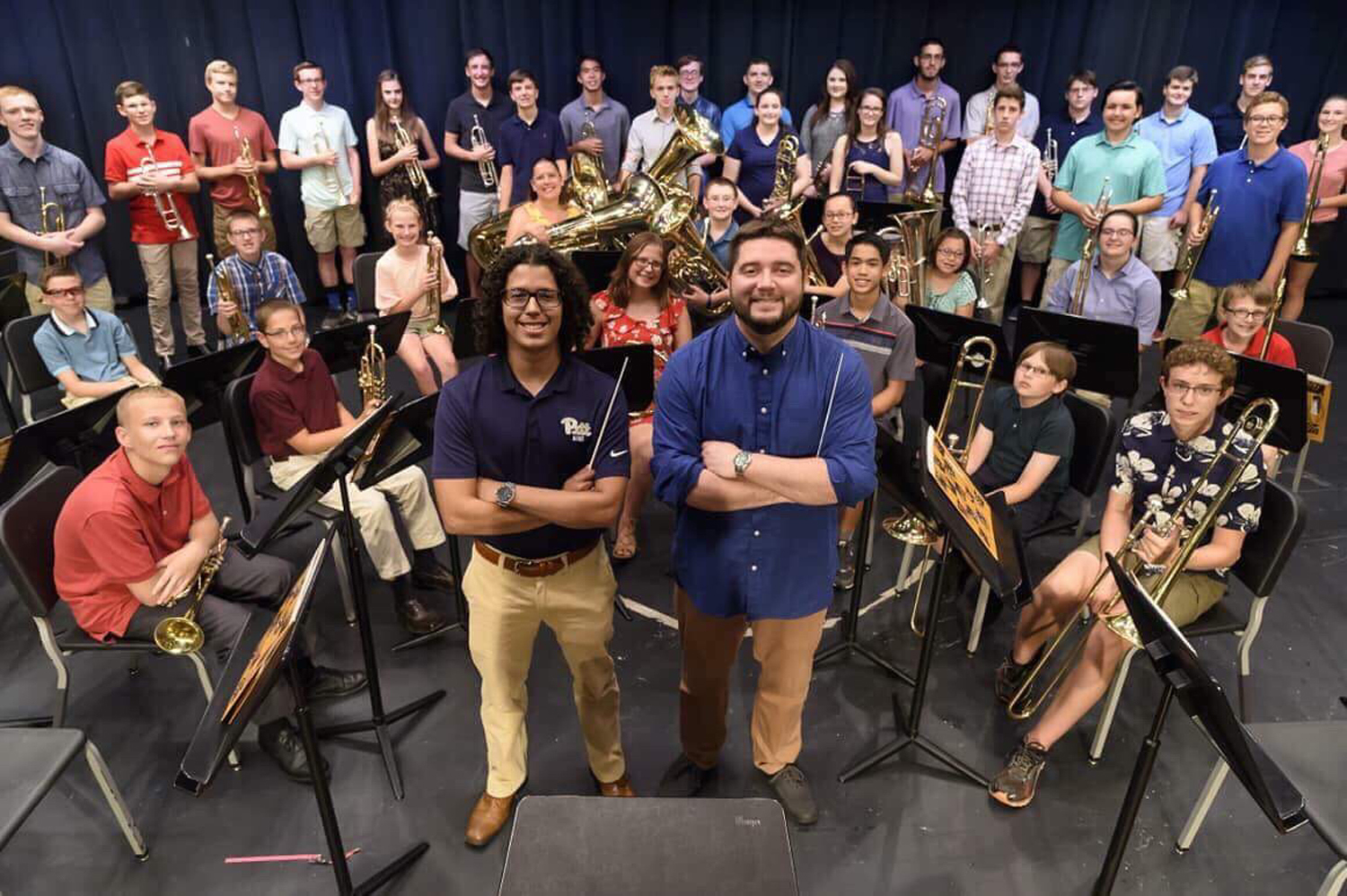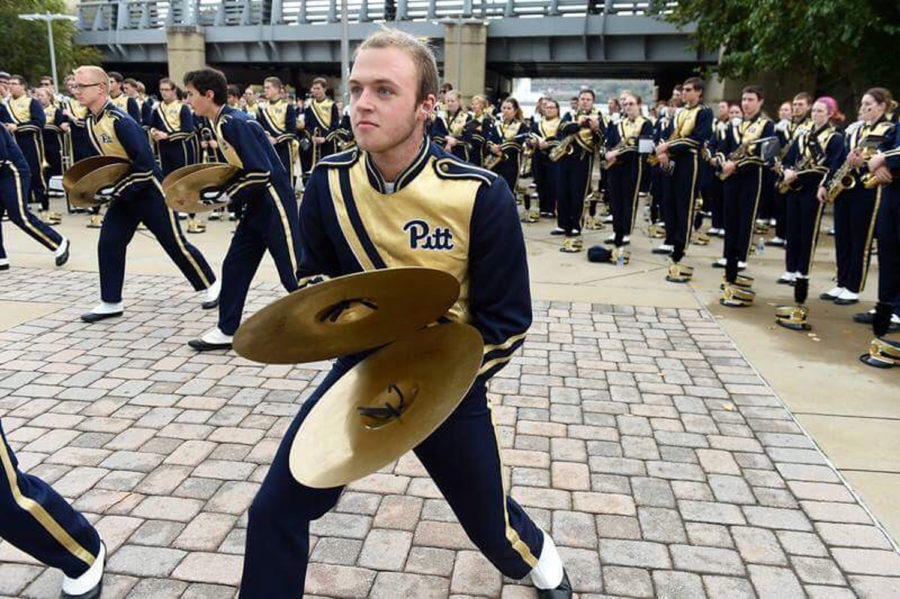Music majors look forward to harmonious futures
Photo courtesy of Jonathan Heller
Senior music composition and economics major Jonathan Heller performs with the percussion section of Pitt Band outside Heinz Field.
September 12, 2018
The pressure to find a balance between the employment world and their passion for music is not something out of the ordinary for music majors.
Oftentimes, the only way to accomplish this is through double majors. At Pitt, the music department recognizes the struggle for this balance, and encourages students to study related areas to open up more opportunities with their music degrees.
“The whole idea is that you’re going to have to be fluid with your jobs, so it’s good to have more than just music,” Jonathan Heller, a senior majoring in music composition and in economics, said.
Heller applied to Pitt as a biology major. After realizing biology wasn’t for him, he switched to economics — and when he found out he could also add a music major on top of economics, he did just that in his sophomore year.
“Most music schools are an audition-in — it’s a very large process and you can basically only commit to just music,” Heller said. “Where here, the way it’s set up, it’s really easy to commit to two [majors], compared to other places.”
Music majors at Pitt choose between five tracks — composition, global and popular music, music and cultural history, jazz and performance. Heller is on the composition track. When he decided to add the major, he was already taking music theory classes for fun — it was something he’d always done.
“I started on saxophone in fourth grade, and have played all of the saxophones,” he said. “I learned euphonium in the 12th grade … I’m self-taught on the drum set … and in [Pitt’s] drum line I played cymbals for two years.”
He focuses on writing, producing and recording music — and this year he started focusing on producing music using his computer, rather than writing it for instrumentation.
“Personally, for me, it made more sense to make it all myself,” he said, “instead of having to rely on other people to do it.”
With his expected graduation less than eight months away, the hunt for employment is now on. He’s looking into an internship in New York with Matador Records or doing stage production at various local venues. Currently, Heller is trying to keep busy with freelance music work.
“If I’m producing someone else’s music, I’ll produce anyone’s music,” said Heller. “And if I’m making my own, as long as I can make the sound I want to make, it doesn’t really matter to me what the end job is for that.”
Sophomore Thyra Altunin didn’t wait until this year to declare her music major.
“It’s definitely something that I thought about for a long time. I came here with the intent,” she said. “I knew directly what I wanted to do.”
Altunin, who is on the music and cultural history track, experienced life in Rome this summer during an internship, in which she wrote textbooks for Latin and Greek languages.
Before her internship, she wasn’t sure how she was going to incorporate her love for music and music history with her knowledge of the classics — but she found a way in Rome.
“I was writing sections about ancient music and writing exercises that kids could do about ancient music and drama, because that’s a huge part of their culture,” she said.
Along with her internship this summer, Altunin worked at a classical music festival in her hometown — Incline Village, Nevada — after volunteering there for the past six years.
“The internship gave me a different perspective on both classics and music,” she said. “This gave me a different perspective on working with music in the business sense and working with the people that make the music.”
Altunin worked closely with the musicians, from processing their paychecks to making collectible cards for each of them to conducting video interviews with them. She was also able to sit in on rehearsals and help with logistics like organizing sheet music and helping the musicians take notes.
“I have a lot of new resources now — I’m really good friends with the conductor … I have a lot of new friends in New York City who play for the Met,” Altunin said. “It gives me just a whole new world of opportunities and networking opportunities, and it’s even just knowing that if I need anything, I could ask somebody from there.”
Connections helped Michael Buckstein — a 2018 Pitt graduate who majored in music composition and psychology when he was at Pitt — along his path too. When he was a senior at Pitt, he started working at Plum High School, about 15 miles away from Oakland, as an assistant marching band director.

(Front left) Michael Buckstein — a 2018 Pitt graduate who majored in music composition and psychology — worked as an assistant marching band director at Plum High School during his senior year at Pitt.
“It was really great to be able to get experience in the field that I wanted to go into while I was still in school,” he said. “The director there was very understanding of my schedule, but I wish I would have had a little more free time to actually be physically present there.”
Before that, he spent plenty of time around music. He said the turning point in his college career was when he was a student employee with the Pitt Band.
“I was there for three years. I got to be up in the band room most days. All over the summer I copied music, I edited music, I wrote some stand tunes for the band to play — and that’s where I truly got to see how a major college band runs,” Buckstein said. “That experience was what solidified my commitment to going into music education and hopefully running a band of my own some day.”
Now, he’s a graduate student at Indiana University of Pennsylvania and he’s taking courses in music education to work toward a third bachelor’s degree and a Pennsylvania teaching certification. He has a couple words of advice for any current music majors who are trying to pursue a future in the field — make connections.
“Basically, any business is all about connections, especially in the music world. The music community is very small, so get to know as many people as you can,” he said. “Just get your name out there and there’s sure to be stuff that pops up.”



